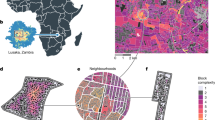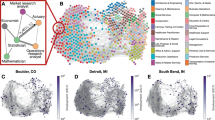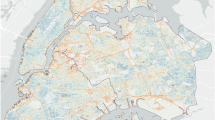Abstract
How do local regulations and practices enable or constrain informal work’s potential to contribute to inclusive economic development in US cities? Amid employment and migration crises, informal work provides critical safety nets for those excluded from formal labor markets. Urban planning approaches in San Francisco and New York City often dismiss, disregard or disable informal workers. Examining street vendors and waste pickers, we show how status quo regulatory approaches are not only exclusionary but also miss opportunities to recognize these workers’ contributions. We draw from case studies in the Global South to propose an alternate, inclusive governance approach.
This is a preview of subscription content, access via your institution
Access options
Subscribe to this journal
Receive 12 digital issues and online access to articles
$119.00 per year
only $9.92 per issue
Buy this article
- Purchase on SpringerLink
- Instant access to the full article PDF.
USD 39.95
Prices may be subject to local taxes which are calculated during checkout
Similar content being viewed by others
References
Ghertner, D. A. in Worlding Cities (eds Roy, A. & Ong, A.) 279–306 (Wiley, 2011).
Leal Martínez, A. in Futureproof: Security Aesthetics and the Management of Life (eds Ghertner, D. A. et al.) 245–270 (Duke Univ. Press, 2020).
Tucker, J. & Devlin, R. T. Uncertainty and the governance of street vending: a critical comparison across the north/south divide. Int. J. Urban Reg. Res. 43, 460–475 (2019).
Carré, F. in The Informal Economy Revisited: Examining the Past, Envisioning the Future (eds Chen, M. & Carré, F. J.) 52–59 (Routledge, 2020).
ILO. Women and Men in the Informal Economy: A Statistical Picture (International Labour Organization, 2018).
Definitions of Informal Economy, Informal Sector and Informal Employment (OECD Publishing, 2019).
Chen, M. A. The Informal Economy: Definitions, Theories and Policies (Women in Informal Employment: Globalizing and Organizing (WIEGO), 2012).
Marinic, G. & Meninato, P. (eds) Informality and the City: Theories, Actions and Interventions 1st edn (Springer, 2022).
Alejo, E. & Schoenecker, A. Policies of exclusion: space, time and the informal economy in Chicago. Space Cult 23, 477–491 (2020).
Devlin, R. T. Asking ‘Third World questions’ of First World informality: using Southern theory to parse needs from desires in an analysis of informal urbanism of the Global North. Plan. Theory 17, 568–587 (2018).
Devlin, R. T. ‘An area that governs itself’: informality, uncertainty and the management of street vending in New York City. Plan. Theory 10, 53–65 (2011).
Duneier, M. Sidewalk 1st edn (Farrar, Straus & Giroux, 1999).
Dunn, K. in Food Trucks, Cultural Identity and Social Justice (eds Agyeman, J. et al.) 67–86 (MIT Press, 2017).
Ehrenfeucht, R. Designing fair and effective street vending policy: it’s time for a new approach. Cityscape 18, 11–26 (2016).
Gowan, T. Hobos, Hustlers and Backsliders: Homeless in San Francisco (Univ. of Minnesota Press, 2010).
Loukaitou-Sideris, A. & Ehrenfeucht, R. Sidewalks: Conflict and Negotiation over Public Space (MIT Press, 2009).
Martin, N. Food fight! Immigrant street vendors, gourmet food trucks and the differential valuation of creative producers in Chicago. Int. J. Urban Reg. Res. 38, 1867–1883 (2014).
Martin, N. in Food Trucks, Cultural Identity and Social Justice (eds Agyeman, J. et al.) 207–224 (MIT Press, 2017).
Mukhija, V. & Loukaitou-Sideris, A. The Informal American City: Beyond Taco Trucks and Day Labor (MIT Press, 2014).
Porras Bulla, J., Rendon, M. & Espluga Trenc, J. Policing the stigma in our waste: what we know about informal waste pickers in the global north. Local Environ. 26, 1299–1312 (2021).
Rosales, R. Fruteros: Street Vending, Illegality and Ethnic Community in Los Angeles (Univ. of California Press, 2020).
Farah, I. The Scramble for the City: Street Vending, Politics and the Governance of Public Space in Mexico City and San Francisco (UC Berkeley, 2024).
Harvey, J., Hegel, C. & Hartmann, C. Independent recyclers in New York City: sector profile and pathways to inclusion. surewecan.org http://www.surewecan.org/study2023 (2023).
Immigration Research Initative. Street Vendors of New York (Immigration Research Initiative, 2024).
Devlin, R. T. No Place for Street Vendors: Global Capital and Local Exclusion in an East Asian Immigrant Enclave of New York City (WIEGO, 2020).
Devlin, R. T. Winning a Right to the Sidewalks: Street Vendors in New York (WIEGO, 2021).
Farah, I. The legitimacy trap: street vending heterogeneity and selective enforcement in San Francisco. Int. J. Urban Reg. Res. (in the press).
Hegel, C. & Hartmann, C. COVID-19 Crisis and the Informal Economy: Canners in New York City, USA (WIEGO, 2021).
Levi-Faur, D. & Kariv-Teitelbaum, Y. in The SAGE Handbook of Political Science (eds Berg-Schlosser, D. et al.) 1152–1172 (Sage, 2020).
Harvey, D. The right to the city. New Left Rev 53, 23–40 (2008).
Blomley, N. Rights of Passage: Sidewalks and the Regulation of Public Flow (Routledge, 2011).
Heathcott, J., Soffer, J. & Zimmerman, R. (eds) Urban Infrastructure: Historical and Social Dimensions of an Interconnected World (Univ. of Pittsburgh Press, 2022).
Edwards, S., Cordle, M., Jamieson, O. & Grushack, S. Employment and Economic Impact of Container Deposits (Eunomia, 2019).
New York Bottle Bill Resource Guide (Container Recycling Institute, 2023).
Zimring, C. A. Cash For Your Trash: Scrap Recycling in America (Rutgers Univ. Press, 2005).
Message in a bottle. nypirg.org https://www.nypirg.org/pubs/202405/BBBB_Final_Media_5.6.24.pdf (New York Public Interest Research Group, 2024).
DSNY Rules and Regulations. A Summary of Sanitation Rules and Regulations (New York Department of Sanitation, 2015).
WIEGO Blog. In India, Pune’s poorest operate one of the world’s most cost-effective waste management models. WIEGO https://www.wiego.org/blog/india-pune%E2%80%99s-poorest-operate-world%E2%80%99s-most-cost-effective-waste-management-models (2019).
Parra, F. & Abizaid, O. Formalization as Public Service Providers: Achievements and Obstacles for Colombia’s Waste Pickers (WIEGO, 2021).
Dias, S. M. Recycling in Belo Horizonte, Brazil—An Overview of Inclusive Programming (WIEGO, 2011).
Chikarmane, P. & Narayanan, L. Statistics on Waste Pickers: A Case Studies Guide (WIEGO, 2024).
Reynoso, T. R. & Vanek, J. Street Vendors and Market Traders in 12 Countries: A Statistical Profile (WIEGO, 2024).
Street Vendors Act. mohua.gov.in https://mohua.gov.in/upload/uploadfiles/files/StreetVendorAct2014_English(1).pdf (2014).
Nicholls, W. J. & Baran, I. Bureaucratic politicisation and insurgent bureaucrats: a theoretical framework. Antipode 56, 2293–2320 (2024).
Author information
Authors and Affiliations
Contributions
I.F., R.T.D., C. Hartmann, J.H. and C. Hegel jointly conceived the idea for this manuscript through discussions initiated at the 2023 and 2024 Urban Affairs Association conferences and continued via weekly meetings. All authors collaboratively contributed to writing the manuscript, reviewing relevant literature, synthesizing key insights and refining the core arguments. All authors provided critical revisions and participated actively in the final editing.
Corresponding author
Ethics declarations
Competing interests
The authors declare no competing interests.
Peer review
Peer review information
Nature Cities thanks Caroline Skinner, Jing Hiah and the other, anonymous, reviewer(s) for their contribution to the peer review of this work.
Additional information
Publisher’s note Springer Nature remains neutral with regard to jurisdictional claims in published maps and institutional affiliations.
Rights and permissions
Springer Nature or its licensor (e.g. a society or other partner) holds exclusive rights to this article under a publishing agreement with the author(s) or other rightsholder(s); author self-archiving of the accepted manuscript version of this article is solely governed by the terms of such publishing agreement and applicable law.
About this article
Cite this article
Farah, I., Devlin, R.T., Hartmann, C. et al. The governance of informal street work in San Francisco and New York City. Nat Cities 2, 918–923 (2025). https://doi.org/10.1038/s44284-025-00321-y
Received:
Accepted:
Published:
Version of record:
Issue date:
DOI: https://doi.org/10.1038/s44284-025-00321-y



